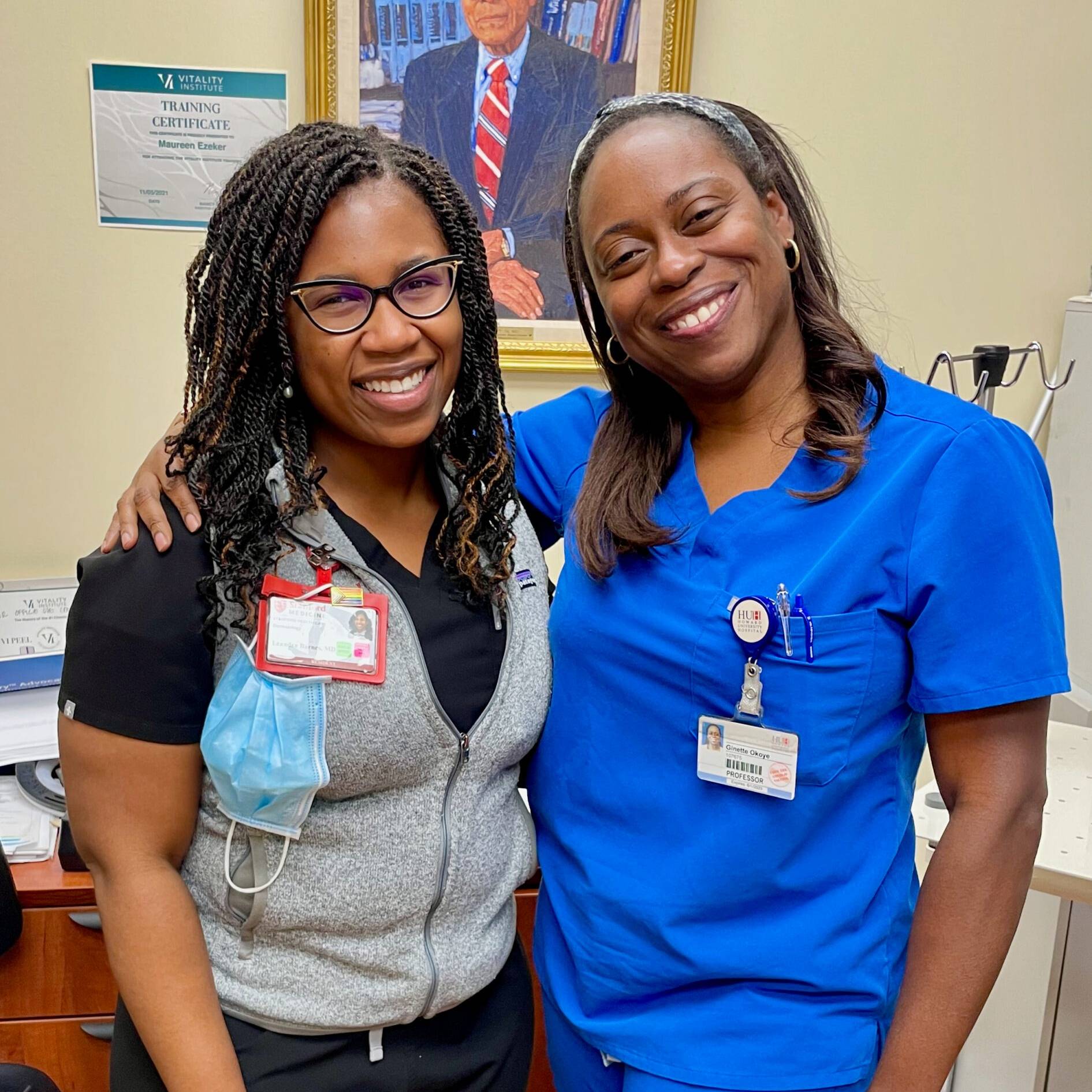
Mentee: Leandra Barnes, MD
Mentor: Ginette A. Okoye, MD
Howard University Hospital
I am excited to share a summary of my experience as a recipient of a 2022 SOCS Observership Grant. I was fortunate to learn from Dr. Ginette Okoye and Dr. Angel Byrd, as well as numerous colleagues at Howard University, in September 2022. This experience has further fueled my passion and commitment to caring for vulnerable and underserved communities via clinical and research interests in medical and procedural hidradenitis suppurativa (HS) and skin of color, teaching and mentoring, and the promotion of diversity, equity, inclusion, and justice in healthcare.
In the dermatology clinics at Howard University Hospital, I cared for patients of color and cultivated skills in the medical and procedural management of HS with Dr. Okoye. I worked closely with the Howard residents and medical students to collect histories, perform comfortable physical exams, develop therapy plans, and perform deroofing surgeries over the month. I also learned the nuances of diagnosing HS and its many mimickers, such as cutaneous Crohn’s disease. I was able to use these skills to facilitate comprehensive
medical and procedural dermatologic care for our HS patients at Stanford Dermatology through my novel hybrid continuity clinic. This past month, we performed our first deroofing surgery on one of my African American female patients. She healed beautifully and was grateful to have her persistent tunnel removed. I plan to bring these experiences to future programs in skin of color and HS to provide comprehensive patient-centered care for those traditionally underserved by dermatology.
In addition to clinical care, I continued research projects in skin of color and HS with Dr. Angel Byrd at Howard University. We previously found that immune complexes can activate macrophages to release proinflammatory cytokines in HS Hurley stage II and III, which yielded a publication in the Journal of Investigative Dermatology. This month, in collaboration with Dr. Carmelo Carmona-Rivera at the National Institute of Arthritis and Musculoskeletal and Skin Diseases (NIAMS), we explored the role of Notch-gamma
secretase in HS skin lesions and tunnels. We also worked on a review to assess the inclusion of samples from African American participants in HS basic science studies. We have preliminarily found that a minority of studies report participant demographics, and only a fraction of those include participants of African descent. I plan to use the skills and relationships that I developed this month to further our understanding of the underlying mechanisms of HS and conditions that affect patients of color.
In summary, my SOCS Observership experiences with Dr. Ginette Okoye and Dr. Angel Byrd at Howard University were invaluable for my learning and growth as a future academic dermatologist with a focus on clinical care and research in HS and skin of color dermatology, teaching and mentoring, and the promotion of diversity, equity, inclusion, and justice in healthcare.
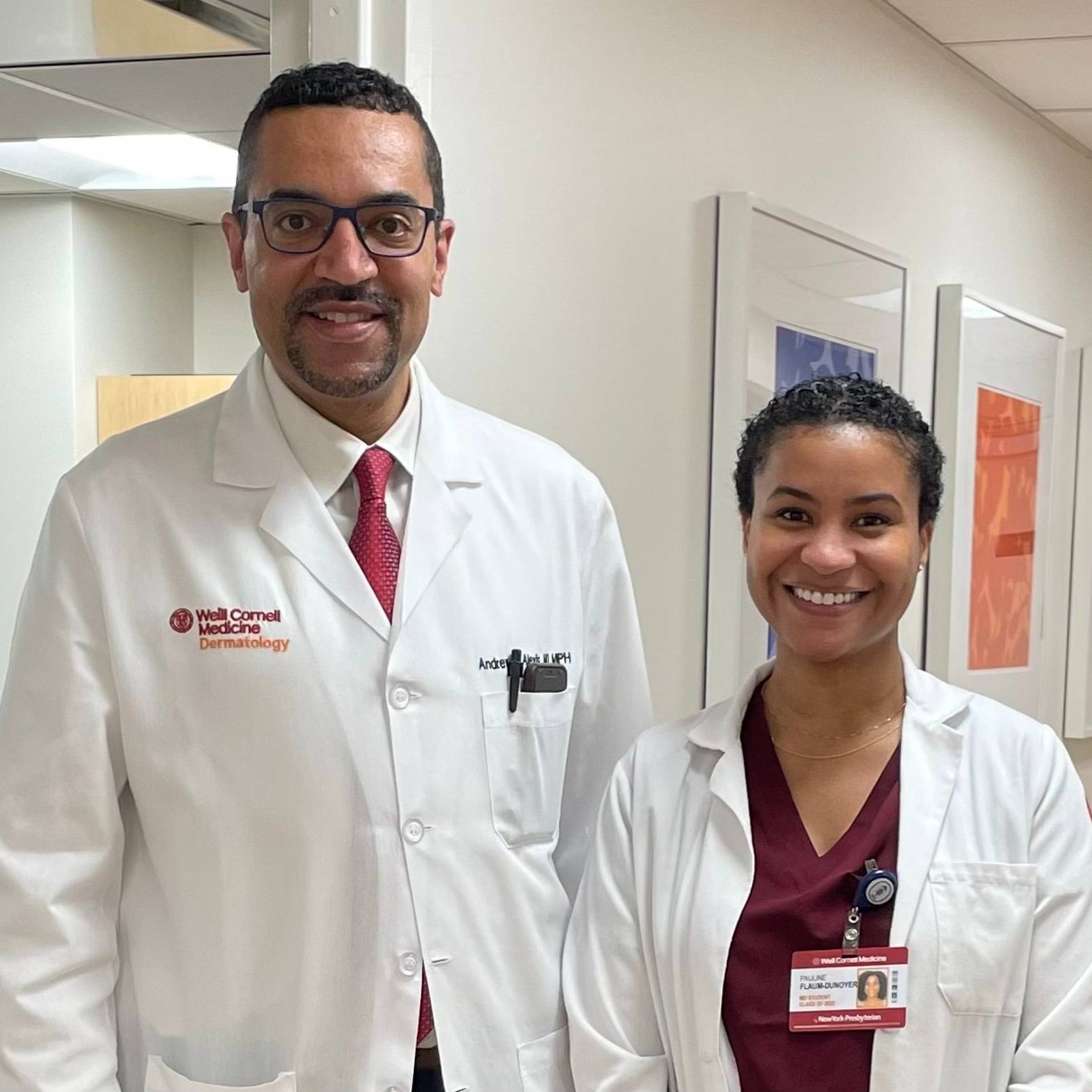
Mentee: Pauline Flaum-Dunoyer
Mentor: Andrew F. Alexis, MD, MPH
Weill Cornell Medicine
My experience working with Dr. Andrew Alexis over four weeks can best be summarized as productive, joyful, and inspiring. On my first day, I was asked what I would like to get out of the rotation. I responded: to learn the most that I can in a month, while getting in the way the least that I can. I say with confidence that I achieved the former. As for the latter, I was pleasantly surprised when I technically did not accomplish this goal, at least, not as I originally imagined it. As a medical student, I have learned to blend into the walls behind me. I am sure many of my fellow students understand what I mean. We try to hover enough to learn but not to disturb. During my rotation, this did not feel necessary. It was easy to find my place among the staff, seamlessly joining into the choreography of clinic and patient care. There were a few missteps, but I never felt like I disrupted the corps. I attribute this to Dr. Alexis and his staff – they created the welcoming atmosphere which allowed me to thrive as part of their team.
I am grateful to the patients as well. I met many each day (it is a busy clinic!) and felt like with each patient, I learned a new lesson I could apply to the next patient. Conversation, and subsequent counsel, became natural and informative. I found myself particularly adept at hair loss consultations. Dr. Alexis has a very structured plan for managing hair loss, no matter the etiology. I learned the steps of this plan on the first day and was able to track my own progress as I familiarized myself with this paramount issue in dermatology, especially in patients with Skin of Color. As a Black woman, I felt strong in my cultural competence with this subject. I was able to meet my patients where they were, through kinship and understanding, strengthened by the wealth of knowledge that Dr. Alexis provided. I built trust with my patients, encouraged by the trust Dr. Alexis and his team had in me.
My joy sprang from newfound confidence in my ability to present my findings, decide on a plan, and convey that plan to the team, all the while explaining the plan to my patients in ways that were digestible and agreeable. My joy continued in the little moments shared with the medical assistants over lunch, commiserating about our lives and shared experiences, or funny anecdotes.
I left the rotation feeling sad it was ending but inspired in so many ways. My commitment to this field was reinforced and I feel excited about my future. I am grateful to know that Dr. Alexis will be a mentor to me for hopefully many years, in my corner supporting my ambitions. Finally, I am inspired by this opportunity in general, and hope that wherever I end up in my career in dermatology, I can pay it forward and welcome others to thrive in dermatology.
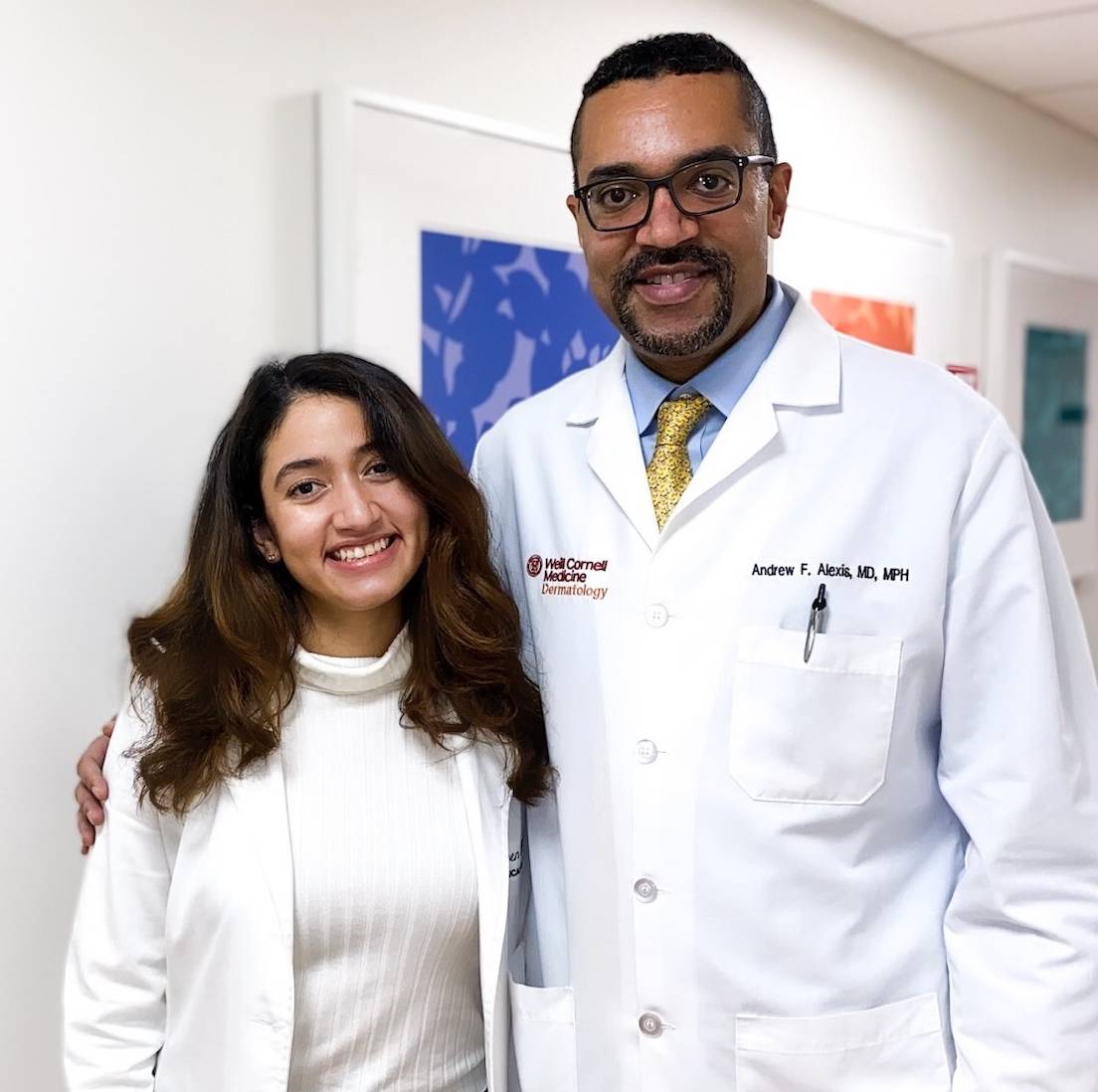
Mentee: Marycarmen Flores, BA
Mentor: Andrew F. Alexis, MD, MPH
Weill Cornell Medicine
I had the privilege of being selected for the Skin of Color Society (SOCS) Observership Grant with Dr. Alexis. To say that I am grateful and blessed to have gone through this experience would be an understatement. Dr. Alexis’ practice of medicine truly emcompases the mission of SOCS. During my time at Cornell I saw many patients of different backgrounds seeking the care of Dr. Alexis after losing hope that their skin concerns could be diagnosed or treated. I witnessed and learned first hand how effortlessly Dr. Alexis listened and examined the patient to provide a clear diagnosis for their ailments.
Amongst the many different pathologies I was amazed at the wide breadth of different presentations associated with hair loss. When I saw how succinct his process of evaluating, diagnosing, and initiating treatment I was simply fascinated. During my time with Dr. Alexis I learned a lot about pathology in SOC, MOA, treatment plans, and tailored clinical reasoning for each patient. With each mentor I learn something different about how I want to practice medicine to best serve my patients. With Dr. Alexis I most importantly saw a physician address concerns with such compassion and dedication than I have ever seen.
With each patient he not only discussed their exam findings but also the pathology details. His practice was very involved in understanding the current literature and clinical studies. This process provided his patients the ability to understand their diagnosis and also how their treatment plan was based on the latest research. This gave the patients a lot of trust in his process because he had thorough explanations behind each of his clinical decisions. His staff and I intuitively began searching for vast cutaneous presentations to see if there could be other worrisome manifestations of systemic causes.
My favorite cases with Dr. Alexis were often the systemic and autoimmune disorders that subsequently presented with cutaneous manifestations. I was challenged to learn everything about the systemic disease and possible cutaneous presentations, in addition to worrisome complications that may not be commonly known. I quickly discovered my interest was strong in complex dermatology cases and this allowed me to constantly read about several treatment options for these conditions. This opportunity also demonstrated to me the key to competent care by working as a group and involving patient’s other physicians to create cohesive treatment plans.
The level of dedication during this process really showed me about the love of academic medicine, through care, and what it truly means to go above and beyond for patients as your normal everyday practice. This was Dr. Alexis’ way of practicing medicine and this is what I aspire to in my future practice. He practices with genuine compassion and dedication, he sets the standard of what care should look like.
I truly thank the SOCS for awarding me this observership!
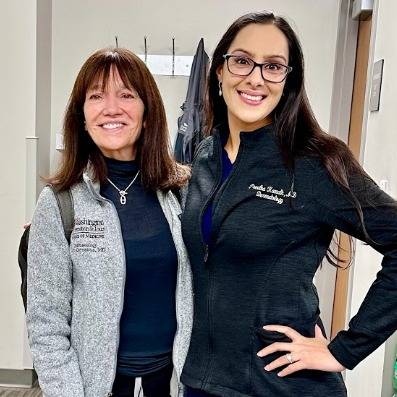
Mentee: Preetha Kamath, MD
Mentor: Lynn Cornelius, MD
Washington University in St. Louis
The Skin of Color Society Observership Grant program allowed me to have an invaluable experience at Washington University in St. Louis working with Dr. Cornelius and Dr. Mwanthi. Prior to my Observership, I was able to connect virtually with my mentors to talk with them about my interests and career goals. We were able to brainstorm ideas and work on a virtual project analyzing social media content pertaining to acral melanoma.
During my Observership, I received both individualized mentorship as well as clinical experience. I had the opportunity to work in the dedicated skin of color clinic and learn pearls to help with making challenging diagnoses as well as tailored management for these patients. I particularly enjoyed learning about the broad spectrum of inflammatory dermatoses such as lichen planus and how to manage pigmentary concerns. I also had the opportunity to learn about mole mapping and new technologies to aid with identification of suspicious pigmented lesions which can be especially challenging to identify in patients with darker skin. My mentors were kind enough to share additional interesting cases and kodachromes with me in skin of color patients. During my rotation I gave a presentation at grand rounds discussing acral melanoma and public health initiatives to increase awareness of this disease entity.
This program has been an amazing opportunity that will have a significant impact on both my personal and career development. I am extremely thankful for the Skin of Color Society Observership Grant program for supporting me and allowing me to build new relationships with mentors who are supportive of the goals that I have set for myself. As I transition to the next chapter in my career, I feel better equipped to care for skin of color populations and will take the pearls that I have learned with me as I progress. Furthermore, I look forward to being part of this program and similar initiatives throughout my career, given the need for not only increasing underrepresented minority student interest in our profession but also ensuring retention. This grant program has provided me with more tools to be a successful dermatologist, colleague, and mentor.
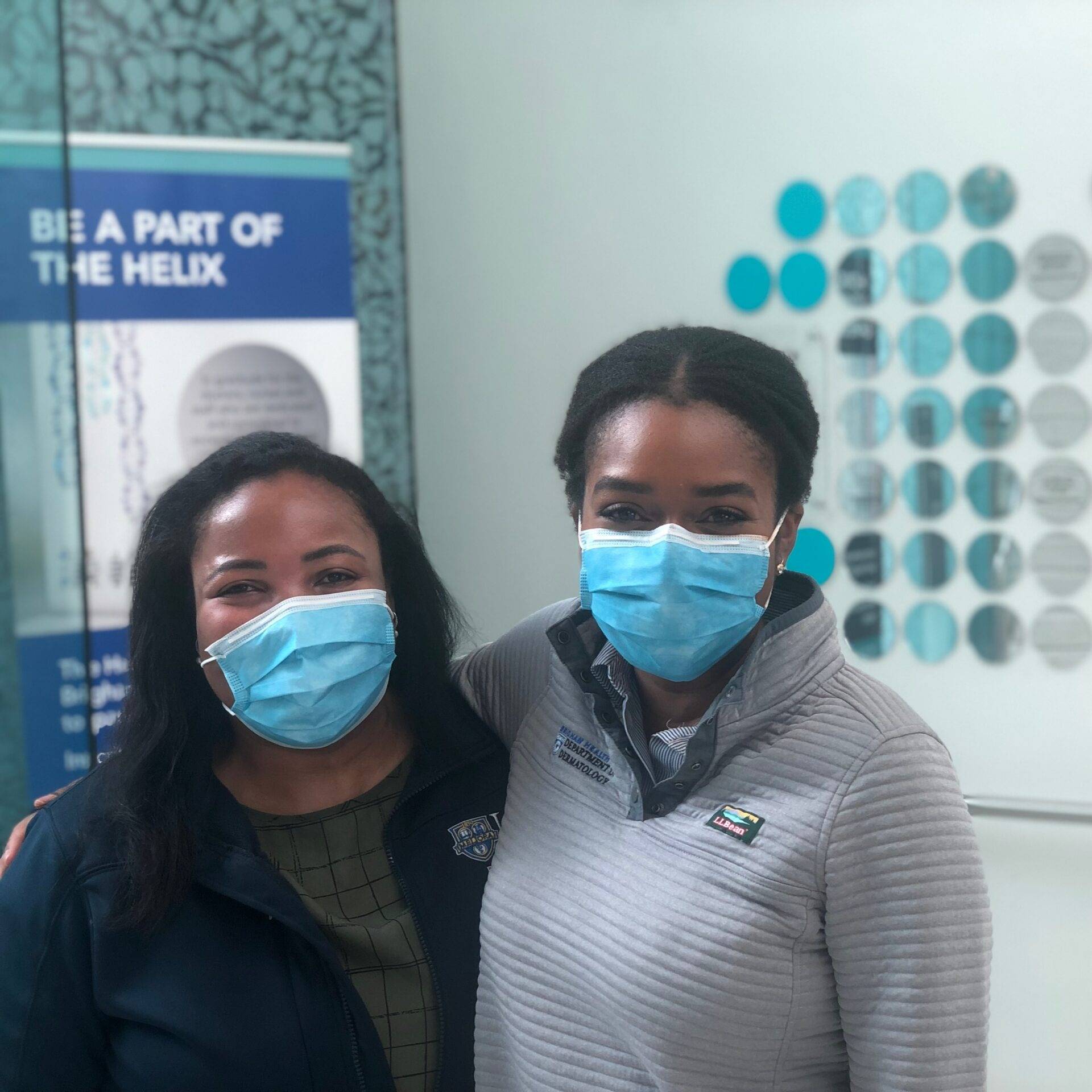
Mentee: Deborah Paul, MD
Mentor: Sotonye Imadojemu, MD
Harvard/Brigham and Women’s Hospital
I am so grateful to have had the opportunity and support to spend a week gaining exposure to skin of color dermatology and complex medical dermatology at the Brigham and Women’s Hospital (BWH). I spent the week with Dr. Sontonye Imadojemu and her colleagues at the Brigham; Drs. Joseph Merola (Rheumatology-dermatology), Avery LaChance (complex medical dermatology), and William Tsiaris (complex medical dermatology and complex wound healing) exploring these subspecialty clinics.
I spent my week elective rotating through a combination of those subspecialty clinics, in addition to rotating through the inpatient consult service in the afternoons. Some of my most memorable patient encounters from that week was in the skin of color clinics, seeing the impact of racial congruent care for these patients and the ease at which they opened up and shared vulnerable/self-conscious details about their illnesses. I was humbled by one patient who was willing to travel back and forth between states to continue her care to be seen in the skin of color clinic and her expression of gratitude for having a doctor “who sees” her and who has shared experiences.
In the complex medical dermatology clinics, I was able to see a few puzzling medical mysteries that I still think about today. Through those cases, I learned how to push my knowledge to exhaust all clinical resources to provide the most comprehensive care and to also be at ease with the unknown which I will surely face in my career. The most important lesson that I learned from those encounters is that sometimes the goal of management may just be at preserving and maintaining quality of life and shared decision making is perhaps the most critical in those encounters.
In addition to the robust and diverse clinical experience that I received; the mentorship was also significant. It is a relationship that I hope to continue as I define my identity in Dermatology and navigate these early stages of my career. Although short, my experience during the week rotation confirmed the passion that I had for skin color dermatology and gave me some ideas on how I can best incorporate that into my future practice, balancing my medical and surgical dermatology interests. I am forever grateful for this award and to my mentor, Dr. Sotonye Imadojemu for this transformative opportunity.